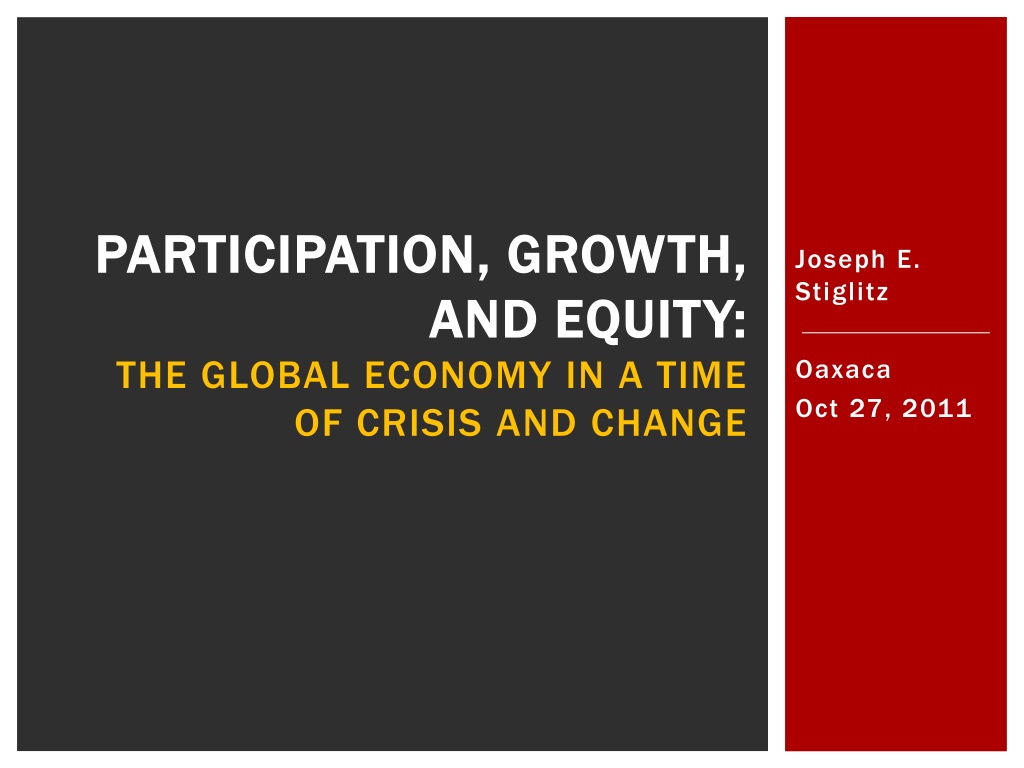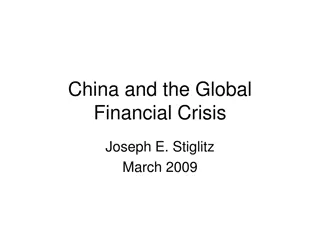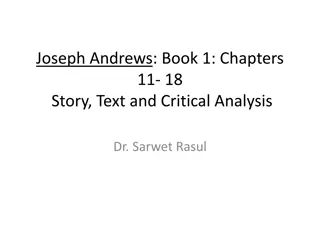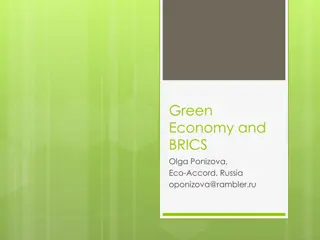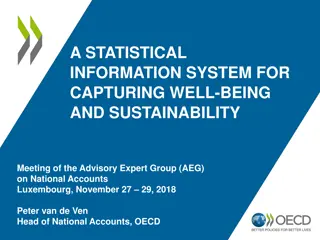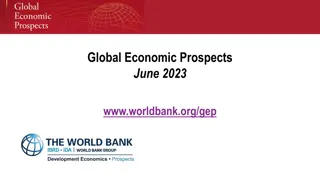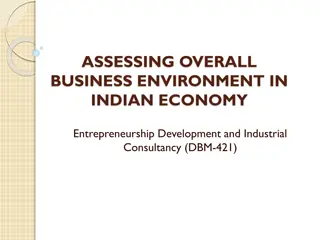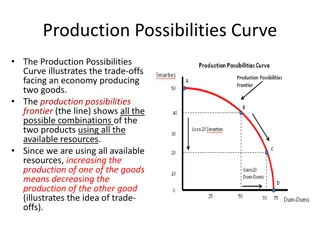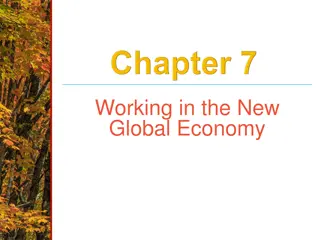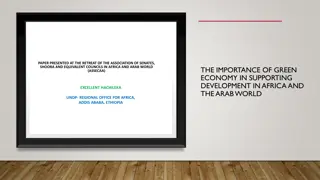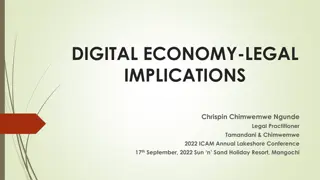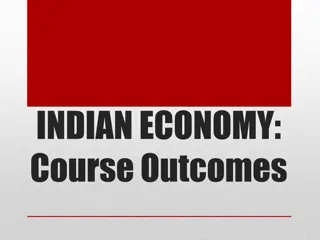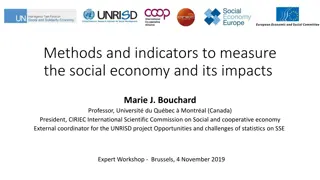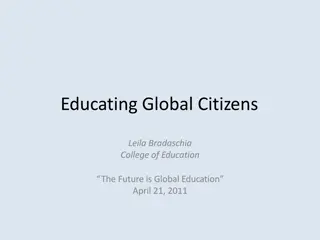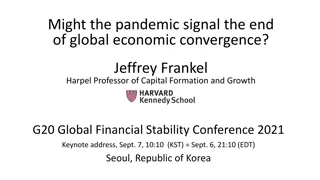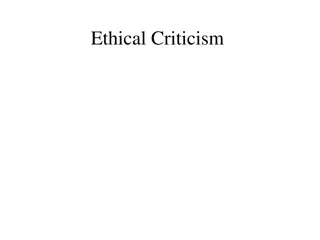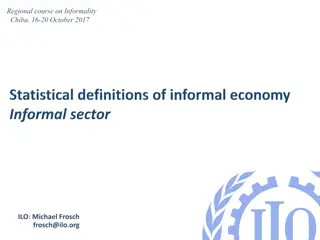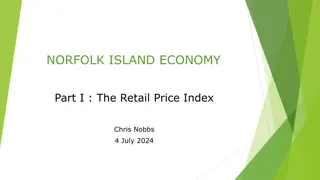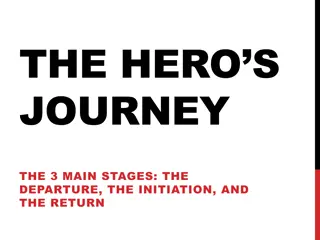Challenges and Possibilities in the Global Economy: Insights from Joseph E. Stiglitz
In a time of crisis and change, Joseph E. Stiglitz highlights the issues of participation, growth, equity, and market failures in the global economy. These challenges include unfair market practices, income inequalities, regulatory shortcomings, and the impact on marginalized groups like the youth. Stiglitz emphasizes the need for reform and addressing societal issues for a more equitable and just economic system.
Download Presentation

Please find below an Image/Link to download the presentation.
The content on the website is provided AS IS for your information and personal use only. It may not be sold, licensed, or shared on other websites without obtaining consent from the author. Download presentation by click this link. If you encounter any issues during the download, it is possible that the publisher has removed the file from their server.
E N D
Presentation Transcript
PARTICIPATION, GROWTH, PARTICIPATION, GROWTH, Joseph E. Stiglitz AND EQUITY: AND EQUITY: THE GLOBAL ECONOMY IN A TIME OF CRISIS AND CHANGE Oaxaca Oct 27, 2011
FROM TUNISIA TUNISIA TO THE INDIGNADOS OCCUPY WALL STREET OCCUPY WALL STREET INDIGNADOS TO Protests are no surprise Real surprise is they didn t come sooner OWS numbers may be small, but many share their views The market is unfair We are the 99% Inequalities not justified by relative contributions (old fashioned theory of marginal productivity theory ) Inequities major complaint in each of the protests The political system is unfair, has been captured by the 1%
THE THE MARKET HASN T WORKED MARKET HASN T WORKED LIKE IT SHOULD LIKE IT SHOULD Competitive theory: Profits are supposed to be zero Supply is supposed to equal demand In practice High unemployment Credit not available, even for good borrowers Banks make large profits, use market power over the payments system, engage in predatory lending In crisis, we socialized losses while allowing the privatization of gains
THE THE MARKET HASN T WORKED MARKET HASN T WORKED LIKE IT SHOULD LIKE IT SHOULD We have homeless people and empty homes Millions of Americans have lost their homes We have vast unmet needs and underutilized resources Retrofitting the global economy for global warming Investments in infrastructure Needs for development Understandable why young people in Spain were indignant Youth unemployment rate more than 40%
OVERREGULATION IS OVERREGULATION IS NOT NOT THE PROBLEM THE PROBLEM Rather, we don t have the right regulations In any society, individuals can take actions that harm others Preventing such harm (externalities) is one of the main objectives of regulation In the US protest, megaphones prohibited But corporations have unbridled spending to amplify political views Banking system is underregulated, which allowed the banks to impose huge costs on the rest of society
THE THE POLITICAL POLITICAL SYSTEM SYSTEM HASN T WORKED HASN T WORKED Banks and their shareholders, bondholders, and bankers were bailed out Those who caused crisis have done well, the rest of society has suffered Banks bailed out without conditions But assistance to ordinary citizens comes with many conditions Banks were supposed to use the money to restart lending Hasn t happened -- used the money for bonuses, dividends No one held accountable for what went wrong Culprits seem to have been rewarded by the victims This was not just an accident it was a manmade event
BANKS BANKS HAVEN T HAVEN T CHANGED CHANGED BEHAVIOR BEHAVIOR Predatory lending Credit card practices Foreclosures even on people who owe nothing on their homes Standard of justice most of the people thrown out of their homes did owe money not acceptable Burden of proof changed guilty until proven innocent Robo-signing epitomizes fraudulent and near-fraudulent practices Political influence used to stop effective reforms
INCOMPLETE INCOMPLETE REFORM REFORM Problem of too-big-to-fail worse Non-transparent CDS s continue Derivatives continue to be underwritten by US taxpayer Capital is still inadequate Accounting practices still deficient Explains fragility of global credit markets Banks know that they can t trust anyone else risk of credit markets freezing
NOT NOT THE WAY THE WAY DEMOCRACY IS SUPPOSED TO WORK IS SUPPOSED TO WORK DEMOCRACY Example: the debate on reform of bank regulation Most Americans want banks to be regulated But political influence of few banks roughly balanced that of 350 million Americans Theory: median voter is supposed to be decisive In practice, doesn t seem to be the case
EXPLAINING THE POLITICAL PROCESS EXPLAINING THE POLITICAL PROCESS Campaign contributions Lobbying Revolving door American process: best government that money can buy
KEY PROBLEMS KEY PROBLEMS Persuading voters to vote They feel participation won t make a difference Self-fulfilling prophecy In 2010 election youth voter turnout almost same as youth unemployment rate: a dismal ~20% Informing voters on complex issues Confusion between household and government finance Belief that austerity is the solution But public skeptical of experts Not surprising: economic experts brought on the recession, and financial experts couldn t manage risk
AGENCY ISSUE AGENCY ISSUE Ensuring that government officials act on behalf of citizens Information is key which is why transparency, right-to-know laws are so important Incentives are important which is why revolving doors are so dangerous and why campaign finance reform is so important
DESIGNING SYSTEMS OF DESIGNING SYSTEMS OF ACCOUNTABILITY ACCOUNTABILITY Always difficult But especially in areas of expertise Is independent central bank right system? Political independence easier to be captured by financial market Less independent central banks (like those of India and Brazil) performed better If independent, still could/should be representative US Fed was not representative, not transparent major flaws in governance which have inflamed popular reaction
DYSFUNCTIONAL DYSFUNCTIONAL DYNAMICS DYNAMICS Large inequalities can undermine social cohesion Which In turn may undermine the political process Worry that state will engage in redistributions And wealthy are less dependent on public provision of services Result: constraints on spending, weakening of government Impairing crucial investments in education, infrastructure, technology Decaying education, social protection more inequality Contrast with successes in Scandinavia GDP is a bad measure, but even on that measure they perform well Even the successful East Asian countries had low inequality Key to their success
THE THE WORLD WORLD AT THE AT THE BRINK BRINK Unemployment in Europe and America still unacceptably high Even 4 years after bubble burst, hundreds of billions spent on banks Risk of another financial crisis and another downturn 2008 US exported toxic mortgages and crisis Now Europe is returning the favor Europe s political problems worse than those of the US European project was top down Inadequate participation from citizenry Lack of support for European solution not surprising Evidence that we didn t do what was needed to be done If another financial crisis occurs, won t be able to take same actions as last time And global coordination that marked last response will be missing
UNDERLYING CRISIS IS ANOTHER UNDERLYING CRISIS IS ANOTHER REDISTRIBUTIVE BATTLE REDISTRIBUTIVE BATTLE Resources (human, physical, intellectual, and natural capital) same as before the crisis Though management of crisis may have undermined social capital Real output after the crisis after we eliminate distortions associated with the bubble should be even higher than before the crisis Key problem claims on resources exceed resources Battle over whose claims are honored In that battle, all will lose, as wealth gets destroyed Debt restructuring can make everyone better off Inflation is a slow process of writing down the real debt But in current environment, neither is likely to happen Implying extended period of malaise
LONG LONG- -RUN PROSPERITY REQUIRES RUN PROSPERITY REQUIRES BALANCE BALANCE OF OF MARKET AND GOVERNMENT MARKET AND GOVERNMENT Restoring social cohesion Creating a fairer society Necessary to make our economy function better, more stably Increasing recognition of link between instability and inequality (IMF) But also necessary to make our politics function better, more stably We need to create a more responsive politics, with more inclusive participation
CREATING A MORE CREATING A MORE RESPONSIVE INCLUSIVE INCLUSIVE POLITICAL PROCESS POLITICAL PROCESS RESPONSIVE AND AND Changes in technology have given us new tools Changes in technology/information make failures even more apparent Political reforms can change current unfavorable dynamic Campaign contributions, mandatory voting, more effective right-to- know laws Reinventing government to make it more responsive and accountable Public support of media, restrictions on media concentration
POLITICS AND ECONOMICS: POLITICS AND ECONOMICS: INSEPARABLE INSEPARABLE Politics sets the rules of the game Unless the rules are set right, the game is neither efficient nor fair And such a political/economic system will not be sustainable
